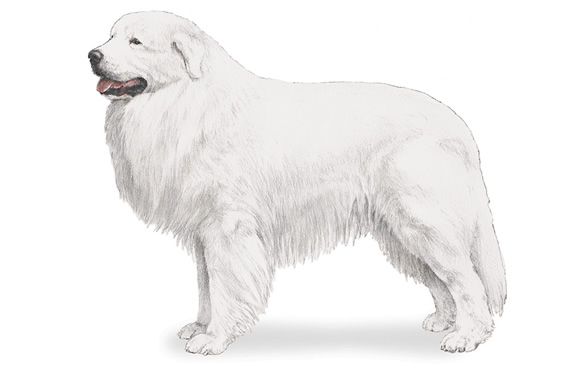

This breed takes its name from the mountain range in southwestern Europe where it was developed to be an indispensable helper to the resident shepherds, guarding the herds of sheep grazed on the steep mountain slopes. This was an occupation of considerable hazard and the breed’s thick, weatherproof coat and indomitable character bear testament to these roots. Adoration for the breeds remarkable abilities spanned social classes – in addition to their association with humble shepherds, they were also highly esteemed among the noble class and appointed French court dog in the 17th century. The Great Pyrenees breed was bred to work autonomously so their independent nature may not predispose them to become obedience stars but they are intelligent and make faithful affectionate family pets. Their protective instincts run deep so they can be very territorial and owners should be prepared barking, especially at night. Their moderately long, thick coats should be brushed out once a week.
Great Pyrenees Related Links:
Each AKC approved purebred breed has its own national club. The mission of these “parent breed clubs” is to improve and preserve a particular breed by advancing knowledge about its history, its health, and care requirements. They also work to assure that the breed’s form and function remain true to its historical physical type and character: A Dalmatian, for instance, should be athletic and have a natural affinity for working with horses. A Fox Terrier should have the right body size and shape, and a drive to go after vermin.
Pet owners, breeders, trainers, veterinarians, and others with a special love for a breed become members of the parent breed club to meet like-minded enthusiasts and to support the club’s mission. The nation’s top breed experts are members of the parent club.
The national parent breed club is the first and best place to go to learn about a breed or find a knowledgeable, experienced breeder.
 Discover Animals is a web-based educational resource offered by the NAIA
Discover Animals is a web-based educational resource offered by the NAIA